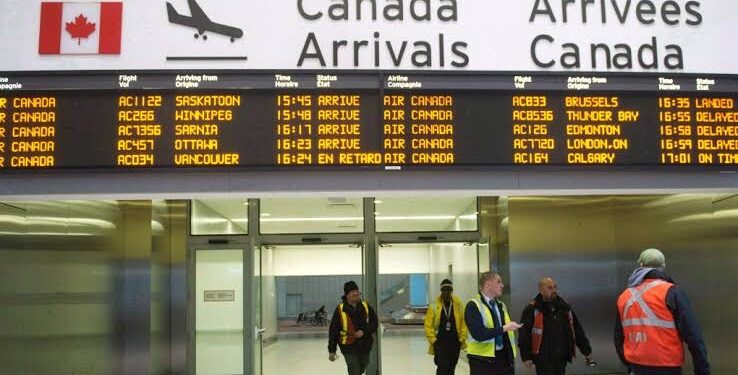Record numbers of Nigerians are making Canada their new home. The country is currently recording its highest number of Nigerian permanent residents (PRs) in a year.
Recent data from Immigration, Refugees and Citizenship Canada shows that as of April 2024, up to 1,905 Nigerians are permanently residing in Canada, the highest number since March 2023. The number of Nigerians immigrating to Canada has been steadily increasing in recent years. The number of new Nigerian permanent residents (PRs) in Canada has increased from 5,445 in 2015 to 17,460 in 2023.
According to the country’s latest immigration data (2016 and 2017), in the first four months of 2024, the number of Nigerians arriving in Canada as new permanent residents has already reached 6,600, surpassing the total number of new Nigerian permanent residents in the year 2015. This figure is slightly higher than the record in 2020 when movement was halted due to COVID-19.

Figures from January to April show that Nigerians will be Canada’s fourth largest international permanent resident population in 2024, behind India, the Philippines, and China, which have more than five times the population of the West African country. Since March 2023, Canada has seen a steady increase in the number of Nigerian permanent residents, with an average of 1,392 arrivals per month.
This trend will be especially strong from December 2023 onwards, suggesting that if this trend continues, PR admissions in 2024 may exceed admissions in 2023. On April 30, 2024, the Government of Canada increased fees for all permanent residence applications by 10 percent. The depreciation of the Naira has made the already high fees more unaffordable than ever for the average Nigerian earner.
However, this has hardly discouraged Nigerians who are determined to continue spending millions in Naira to qualify for Canadian permanent residence. PR status gives non-Canadian nationals the right to live and work in the country indefinitely.
It functions as an immigrant visa and entitles the holder to most social and health benefits available to Canadian citizens, including protections under Canadian law. Canada is facing a labour shortage due to an aging population and a falling birth rate, forcing it to step up efforts to attract younger and more diverse immigrants through attractive travel conditions.

In Nigeria, where many of the 115 million workers earn less than $20 a month in an inflationary economy, the prospect of wage increases is a big motivator for Nigerians. With a Canadian permanent residence permit, caretakers receive up to $1,042 a month, plus an additional $41.74 for suites. For buildings, the maximum monthly salary is $3,548.63, plus an additional $61.
Also, given the labour shortage in skilled trades and the medical sector, salaries for qualified professionals are competitive. Canadian immigration law prioritizes professionals and highly qualified individuals, making it easier for them to obtain work and permanent residence permits, including the Express Entry system, which uses a competency-based points system to grant post-study work permits and permanent residence permits in Canada.
This approach contrasts sharply with other countries, particularly the UK, where restrictive immigration policies pose significant challenges for Nigerians and other international talent.
After the home childcare provider and home support worker pilot programs ended, Canada launched a newer, accelerated overseas caregiver pilot program that grants permanent residency on arrival to professional caregivers, with Nigeria as part of the target group. Immigration data from 2023 onwards shows that permanent immigration to Canada from developing countries continues to increase. The country has already exceeded its goal of attracting 500,000 immigrants by 2025, but its doors remain open.

































